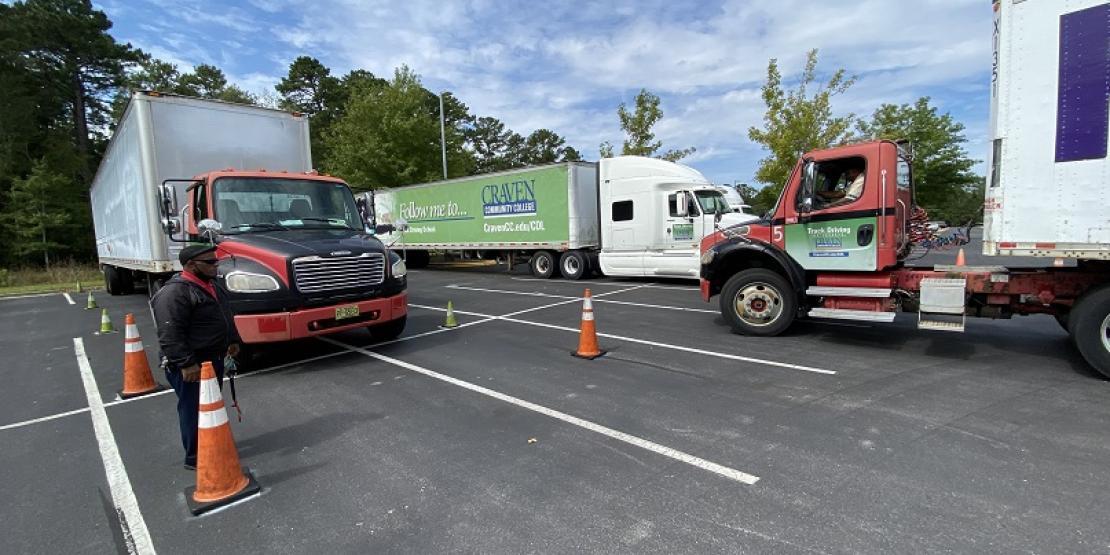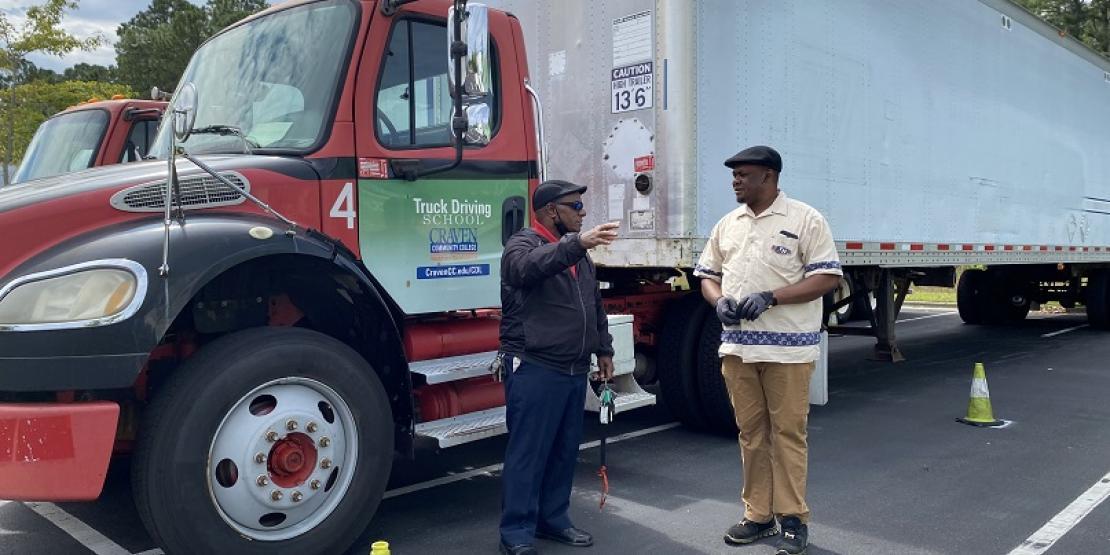By Holly Desrosier
Craven Community College (Craven CC) has had many beneficial partnerships with neighboring community colleges throughout the years. Among the most notable, the college partnered with several local community colleges to help get Commercial Driver License (CDL) programs on the road to success.
When Craven CC started its CDL program in 2015, it was the first of its kind in the immediate area. It quickly gained traction, and other community colleges in the region took notice and wanted to provide their own students with a quality truck driving training program. Before long, Craven CC was collaborating with three of those community colleges.
“The course held its first class summer of 2015,” said Volt Center Director of Trade Programs Jeff Schulze, who oversaw the CDL program when it began. “Initially, we were the only school offering it in our specific area of inner coastal Carolina. After a year, Carteret CC wanted to partner with us, so we established that relationship and helped them out. Eventually, Lenoir CC got wind of this, and we began conversations with them. Before you know it, James Sprunt knocked on our door.”
When Craven CC began partnering with Carteret CC in 2016, they shared a tractor-trailer, instructors and revenue between the two programs. This enabled Carteret CC to get their program rolling but limited opportunities for both colleges. Now, after a recent donation of a refrigerated tractor-trailer truck to Carteret, both programs are able to operate individually.
Craven CC is honored to have supported Carteret, Lenoir and James Sprunt CC in establishing their own CDL programs within the past five years. Craven CC and its surrounding community colleges have learned that collaborating and supporting each other not only leads to improved programs and enrollment, but also improved student satisfaction and stronger communities.
“One of the slogans of the North Carolina Community College System is that we’re 58 strong,” said Craven CC President Dr. Ray Staats. “We take great pride in helping each other. When we know that our neighbors have similar needs, it is a matter of pride and obligation to help them out.”
The college previously partnered with Carteret CC for several years to provide the Hospitality Management program, and the Craven CC Volt Center campus is currently working with Lenoir CC to jumpstart their construction trades program. Craven CC is also one of a handful of regional community colleges that supports the North Carolina Aerospace Corridor, which helps establish Craven, Lenoir and Wayne counties as a world-class aerospace and aviation corridor and promotes the region’s common assets to capitalize on growth opportunities.

In addition, Cape Fear CC recently provided Craven CC with technical support that will to help start the new Diesel Technology program at the Volt Center. Staats noted the importance of “paying it forward” and establishing bonds where neighboring colleges feel comfortable with supporting each other as well as receiving help.
“Whatever our neighbors need, if it’s going to help students, then it’s a no-brainer,” he said. “Carteret’s students needed truck driver training, they didn’t have the immediate means, so we were there to help until they could do it on their own—the same thing Cape Fear is doing for us.”
Craven CC’s CDL program has really picked up speed since its start, with 266 students having graduated so far. The program provides training to meet the Federal Motor Carrier Safety Administration standards of specialized training in the areas of driver qualification, hours of service, driver wellness and whistleblower protection for entry-level drivers who are subject to the requirements.
Students in the program study for their Class A CDL by receiving classroom instruction and experiencing behind-the-wheel truck driving that prepares them for the North Carolina State Commercial Truck Driving License examination. The program usually spans seven to eight weeks. Upon successful completion, graduates should have an excellent foundation for a truck driving career. Students are tested thoroughly on the road and through written exams to ensure that they possess the necessary skills and knowledge to successfully and safely operate commercial vehicles.
Craven CC Director of Service Programs Sandra McKenzie noted that class sizes vary but usually range between four and 13 students. The smaller sizes make it easier for students to receive more personalized instruction. By the time they graduate, most students already have job offers.
According to Indeed.com, the 2020 median pay for tractor-trailer truck drivers ranges from approximately $61,000 to $92,000 per year. Over the next 10 years, the U.S. Bureau of Labor Statistics anticipates an additional 30,600 truck drivers will join the workforce and may increase as the nationwide demand for goods drives the need to keep supply chains moving. Since the industry is experiencing a shortage, now is a great time for students to get on the road to a successful trucking career.
“They’re short of drivers,” said Staats. “It’s the same issue as with commercial pilots: There are more retirements than young drivers coming on board.”
While a truck-driving career doesn’t require a degree, it does require a significant personal commitment on the part of the driver, as the job can entail spending days or weeks away from home at a time. It’s often described as not only a career but also a lifestyle, and one that Craven CC is proud to teach.
The next orientation will be held Nov. 19 at 5:30 p.m. for programs beginning Dec. 1, 2020 and Jan. 4, 2021. For more information on Craven CC’s CDL program, contact 252-638-7248 or WFDinfo@cravencc.edu.
This article was originally published in the New Bern Sun Journal on September 30, 2020.
